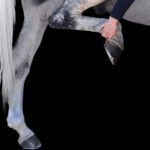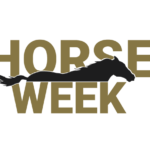April 27, 2002 — What a mess! The rains came to the Rolex-Kentucky three-day event just as the morning session of cross-country was ending, and the weather jumbled the standings. The poor souls who had to ride in the afternoon faced a freezing downpour if they chose to run — and many didn’t.
We had scratch after scratch, including the overnight leader, Springleaze Macaroo with William Fox-Pitt of Great Britain, who decided to call it a day after struggling on the soggy steeplechase course.
Going to the head of the class was Kim Vinoski of the U.S. with Winsome Adante. Not coincidentally, she ran during the morning. But don’t be too sad for Mr. Fox-Pitt. He stands second with his other horse, Stunning — who also competed in the morning. Kim’s second mount, Royal Venture, fourth after dressage, also did not start cross-country because “it wasn’t worth the risk.” The third-place rider, John Williams of the U.S. with Carrick, rode that horse before the lunch break as well. He did go on course with his second mount, Hazmat, in the afternoon. But the bay gelding jumped poorly into the Head of the Lake, “and I decided to end my day there,” John said.
How hard was it raining?
“I’d see a fence in the distance and put my head down for awhile, then I’d look up and make sure I was still going in the right direction,” said John.
The weather was determined not to be a factor in the death of Titleist, a 9-year-old Thoroughbred who fell after hitting his hind legs on the 10th fence, the ditch and rails. Officials, who formed a committee of inquiry, said the horse died within two minutes of what essentially was a broken neck. Titleist was ridden by Mark Weissbecker, who was not hurt. A source told me Titleist had lost his two front shoes, something of which his rider was unaware, and that may have contributed to the accident.
As the rains got stronger and the field got weaker with all the drop outs, drenched and disappointed spectators began drifting away. It was a shame, because there was such a strong crowd this morning for one of the world’s great equestrian happenings. Don’t forget, there are only three other 4-star rated events in the world. Although I’m soaked and frozen, I’m still grateful to be at the Kentucky Horse Park, one of my favorite places.
And speaking of the Horse Park, I had some great news from its director, John Nicholson. He’s just back from the FEI (international equestrian federation) general assembly in Morocco, where the Horse Park’s bid to host the 2006 World Equestrian Games was discussed and well-received. It’s going to be quite a horse race as to who gets the WEG, since the only other remaining candidate is Aachen, Germany, one of the world’s greatest horse shows.
I’ll tell you more about that later, but let me get back to the competition.
Michael Etherington-Smith’s course rode beautifully when it was dry, showcasing the talents of so many of the world’s best riders.
“The weather changes it immensely,” John pointed out, but before the conditions deteriorated, it was a joy to see the horses eating up the challenge before them.
I watched how they tackled a huge brush with a ditch in front of it, then collected to turn gracefully and jump a bounce into the first water, flanked by “bottles” of Maker’s Mark bourbon, complete with their red tops.
A good number made short work of the second water at the Head of the Lake, dropping into the drink, taking four strides and clearing a corner that required pinpoint accuracy, then climbing up onto land again and immediately jumping a giant faux goose made of brush. When you stand by a galloping lane and feel the thunder of hooves (I know it’s a cliche, but there’s no other phrase for it) and watch a 1,200- pound animal go airborne over a seemingly impossible fence, then you really understand horsepower.
I wondered if the leaders felt that their achievement was diminished because so many key horses opted out of the test due to the conditions.
“It’s the nature of the sport,” said William. “You do have to ride your luck.”
“It’s the way it goes,” shrugged John. “It’s really too bad that had to happen, but I wouldn’t be sitting here otherwise.”
And, as Kim pointed out, “Our horses still jumped around a 4-star course.”
Roger Haller, chairman of the USA Equestrian eventing committee, noted that having 16 horses eliminated or withdrawn from the 63-horse field reflected the good judgment of riders who are “thinking ahead” to another day.
“If the conditions were not right for their horse, they were going to pull up,” he said. It’s not like the old days when there were so few events that “getting around was the goal, come hell or high water.”
And speaking of high water, the prospect of facing tomorrow’s show jumping in what is predicted to be another drenching rain didn’t faze the top three, who are very close. Winsome Adante has 48.2 penalties, to 48.6 for Stunning and 52.6 for Carrick.
“At least show jumping can’t get bottomless,” said William, though he pointed out it could “get like a swimming pool in there.”
Anyway, my money’s on Kim and “Dan,” who were among the favorites going into the event. Defending champ David O’Connor won’t be a factor. He was eliminated for missing a flag on roads and tracks with Tigger Too, retired on cross-country with the Native and elected not to start his Olympic gold medal mount, Custom Made, in the rain.
Now, more on the Horse Park’s WEG bid: The big thing standing in the way of having Kentucky host this all-equestrian Olympics is piroplasmosis. Yes, that same tick-borne blood disease that caused some problems with the Atlanta Olympics before it was all sorted out.
A number of top European show horses test positive for piro, and the FEI wants them to be able to compete. Piro is no big deal in Europe. But we don’t have it here, and Kentucky horse breeders, with millions of dollars worth of Thoroughbreds to worry about, aren’t interested in taking any chances with it.
John said a blue ribbon task force is working on developing a protocol to handle piro-positive horses, breaking new ground in that area. The task force is expected to deliver its report by mid-summer, and it is hoped the results will be acceptable to both those with piro-positive horses and the Kentucky breeders.
“It’s time that the WEG was held somewhere else other than Europe,” said John, pointing out they are the WORLD Equestrian Games, and they need to move to another continent.
The issue “should not be decided upon emotion, tradition or politics. It should be decided by science,” said John. He did add that if the report showed it would be impossible to have the piro-positive horses here safely, the horse park would bow out of the WEG bidding, because of its concern with the welfare of the area’s horse industry.






